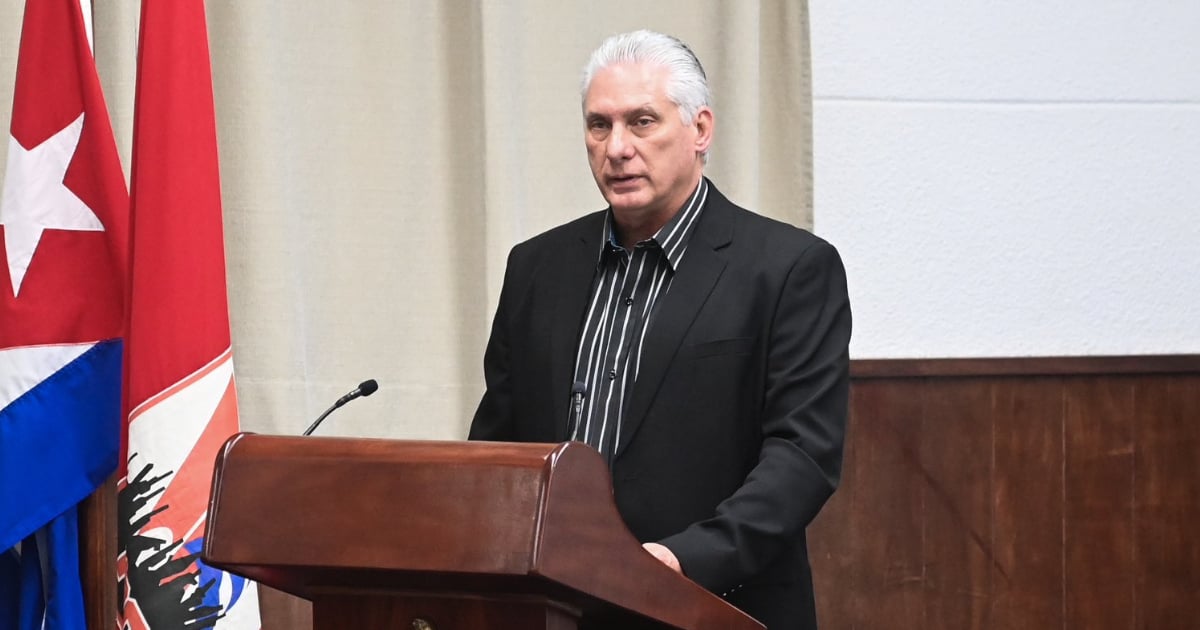
Related videos:
The ruler Miguel Díaz-Canel acknowledged that 2024 has been a very tough year in which "we practically live day by day," although he reiterated his worn-out discourse of solving problems by appealing to "creative resistance."
At the closing of the IX Plenary of the Central Committee of the Party, he asserted that it is possible to emerge from the current crisis, but instead of providing concrete solutions, he reiterated the usual terms: creativity, talent, innovation, work... "The moment is very complex, but not insurmountable," he emphasized.
For Díaz-Canel, the answer to the problems lies in resistance, but not as a synonym for enduring, suffering, or sacrificing. He insists that resistance must be rooted in rebellion, strength, energy, and vitality—an optimism that stands in stark contrast to the exhaustion and suffering of the people who witness their lives deteriorating each day amidst widespread scarcity.
"We do not have in our Cuban genes the tendency to lament and choose sacrifice. Cuba has come this far through struggle and creativity, turning setbacks into victories," he expressed.
Overlooking the population's rejection of its political leaders, the president urged the Party to call for mobilization to produce and achieve results that would improve the living conditions of the people and enhance their salaries and pensions.
Regarding the prolonged blackouts, he did not provide any solutions, not even long-term ones. He merely praised the solidarity among neighbors and how people help each other by sharing food, storing leftovers in the refrigerator, or charging cell phones for those with a generator.
"During these difficult times, we have come to appreciate the values that cannot be lost; rather, they grow stronger in the face of adversity," he emphasized, before adding that from these situations they will emerge, "because no one gives up here!"
Raúl Castro's successor stated that there are many just complaints from the people regarding the situation of the basic family basket, the liquefied gas crisis, and the shortage of medications—structural problems in the economy that have worsened under his leadership.
"We live with a lot of tension in managing each of them, and this is important to explain so that it's understood that this doesn't happen because we are with our arms crossed," he added, in a tone that avoids addressing the internal responsibilities of the regime he leads and without explaining what is being done to emerge from the predicament.
In a context marked by the devaluation of the national currency, rising prices, and a shortage of basic goods, Díaz-Canel continues to advocate for Marxism, confident that the people will trust socialism when they see it as a system capable of meeting their fundamental material needs. This conviction seems to overlook the state of despair that most of the population is experiencing.
Finally, he briefly mentioned the social challenges faced by the government, noting that inequalities have been created "that we cannot become accustomed to living with."
He did not specify which inequalities he was referring to, considering that his stepson Manuel Anido lives a life of luxury in Madrid alongside the Cuban actress Ana de Armas, while in Havana, Fidel Castro's grandson celebrates his birthday in a bar that he personally manages with the utmost ostentation.
"It is urgent to reduce inequality, have less unemployment, greater well-being, and to increase – when possible – minimum wages and pensions without this leading to a rise in inflation," he stated.
Frequently Asked Questions about the Economic Crisis in Cuba and Díaz-Canel's Speech
What is the economic situation in Cuba according to Díaz-Canel?
Díaz-Canel has acknowledged that 2024 has been a very challenging year for Cuba, marked by a deep economic, social, and political crisis. Despite this, he insists that the country can overcome these difficulties through "creative resistance," although he has not provided concrete solutions to address the structural problems facing the nation.
What does "creative resistance" mean in Díaz-Canel's discourse?
For Díaz-Canel, "creative resistance" is a strategy to confront the current crisis, grounded in rebellion, strength, and innovation. This resistance should not equate to merely enduring or sacrificing, but rather to finding creative solutions to the country's problems, according to the president. However, many critics argue that this proposal lacks practical and effective measures.
How has the Cuban population reacted to Díaz-Canel's statements?
The Cuban population has shown increasing discontent and skepticism towards Díaz-Canel's statements. Many citizens feel that the government's discourse is disconnected from reality and that promises of improvement lack a clear plan of action. Frustration has manifested in protests and criticism, especially on social media.
What challenges does the Cuban government face in overcoming the current crisis?
The Cuban government faces numerous challenges in overcoming the crisis, including shortages of food, medicine, and fuel, currency devaluation, and rampant inflation. Additionally, the lack of effective structural reforms and bureaucracy further complicate the country's economic and social situation.
How does the economic crisis affect the daily life of Cubans?
The economic crisis has had a devastating impact on the daily lives of Cubans, who are facing widespread shortages of basic goods, prolonged power outages, and a decline in their quality of life. Inflation and lack of access to essential resources have exacerbated everyday hardships, creating a climate of hopelessness among the population.
Filed under: